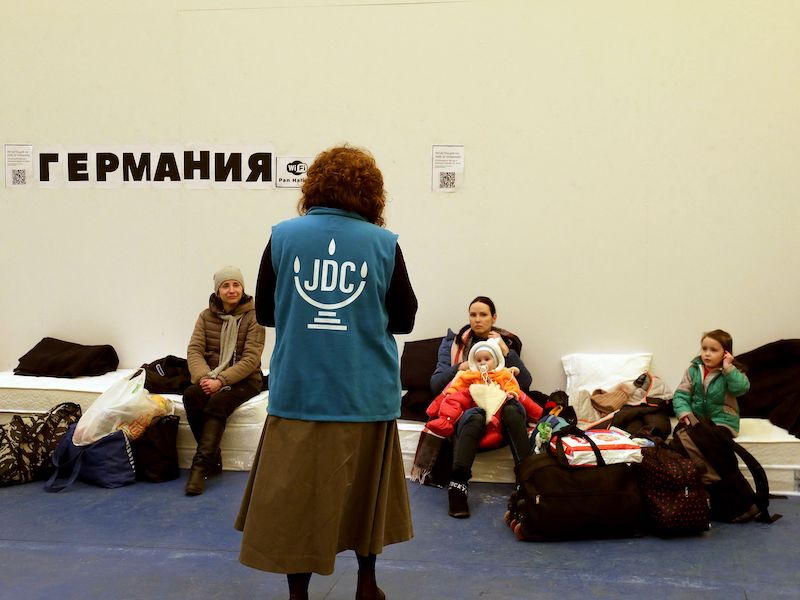doubling down
Exclusive: JFNA’s long-term plan for aid to Ukraine
The plan marks a shift in how Jewish funders are viewing the war — no longer as a short-term emergency demanding a flood of dollars, but rather as an ongoing project that will command Jewish organizational attention, funding and volunteers for at least the next year.


Gil Cohen-Magen/AFP via Getty Images
A JDC staffer helps Ukrainian Jewish refugees in Chisinau, Moldova on March 15, 2022, before they head to the airport to board a plane to Israel.
As Jewish organizations have raised tens of millions of dollars on behalf of Ukraine in a matter of weeks, one question has hovered over the effort: What happens if this conflict lasts for months — or longer?
Now, The Jewish Federations of North America (JFNA) has drafted a plan to answer that question, which its president and CEO, Eric Fingerhut, shared with eJewishPhilanthropy on Sunday. The plan marks a shift in how Jewish funders are viewing the war — no longer as a short-term emergency demanding a flood of dollars, but rather as an ongoing project that will command Jewish organizational attention, funding and volunteers for at least the next year.
“This is obviously going to be a long-term crisis,” Fingerhut told eJP. “Whatever actually happens with the war, the impact of the refugee crisis and the devastation is going to be with us for a long time.”
JFNA initially set a goal of raising $20 million for Ukrainian relief efforts, which it has since more than doubled. Now, it’s jumping an order of magnitude: Fingerhut did not provide a slated dollar amount for the plan, but said it would be in “the nine figures,” that is, more than $100 million. Despite that hefty line item, Fingerhut claims the many other priorities of federations, from social services to Israel advocacy, will not suffer, and may even benefit from a rising tide of donations.
“I do not think the challenge of our time is, ‘Is there enough money to devote to important causes,’” Fingerhut said. “[During] the COVID pandemic, emergency funds were raised and they didn’t in any way take away from the core annual needs. If anything, those were enhanced.”
The plan has four prongs and is slated to last at least 12 months: refugee relief and resettlement; Jewish immigration to and absorption in Israel, known as aliyah; aiding Jews in Russia and Belarus; and, eventually, rebuilding Ukraine when the war is over. Fingerhut said the first two items on that list are the highest priorities. For most of the effort, JFNA will raise money through local Jewish federations and work through the American Jewish Joint Distribution Committee (JDC) and the Jewish Agency for Israel, which have set up operations on Ukraine’s border, as well as in Russia and Belarus.
It will also aim to mobilize volunteers who want to travel to the Ukrainian border, though at this point that initiative is limited to Russian or Ukrainian speakers who have skills — such as social work training — that are of use to refugees. JFNA began recruiting those volunteers 10 days ago, and plans to send as many as 25 to the border next week. That number could expand to 100 over the next three months, with the volunteers each going for a matter of weeks.
“We were getting a flood of requests from people who wanted to volunteer,” Sarah Eisenman, JFNA’s chief community and Jewish life officer, told eJP on Sunday. “There’s a desire from these highly skilled Russian speakers to volunteer and we’re hearing from our partner organizations that they have a need for volunteers.”
Going forward, Eisenman said, JFNA will be looking for a broader range of volunteers — Jewish educators who could serve communities during Passover, for example, or people to provide childcare over the summer. She understands that people are just “doomscrolling — you’re just sitting and want to do something more active.” But at this point, organizations have said they want only highly skilled volunteers. American Jews without Russian language skills, she added, could be more useful helping resettle refugees in the U.S.
“Volunteering can’t just be about the desire for people to go and contribute and bring all of the amazing talents that they have,” she said. “It really is a matchmaking process of taking [stock of], what are the needs on the ground, [combined] with the incredible skills and passion of people who are willing to contribute.”
The refugee aid on the border, Fingerhut said, will target Jews but have a nonsectarian component as well. To that effect, JFNA has lobbied for the U.S. to take in more refugees; Fingerhut called the Biden administration’s recent commitment to take in up to 100,000 refugees “a start.”
The aliyah aid, meanwhile, will include integration in Israel, as well as providing for the needs of mothers with children —many of whom have fled while men between the ages of 18 and 60 were barred from leaving Ukraine in order to defend the country. The Jewish Agency, Fingerhut said, has opened some five new Israeli absorption centers for the refugees.
One of the most delicate areas of JFNA’s plan concerns Jews in Russia and Belarus. While JDC and The Jewish Agency are both active in those countries, Fingerhut said, access to information about those communities is limited, and activists are concerned about provoking government persecution.
“We can absolutely anticipate a major crisis of Jews in Russia and Belarus,” he said. “The economy’s already collapsed. The political oppression is getting worse. We certainly aren’t going to wait until a new Iron Curtain closes before we aggressively work with our partners to get the Jews out of harm’s way and home to Israel or to wherever else in the world they want to go.”












